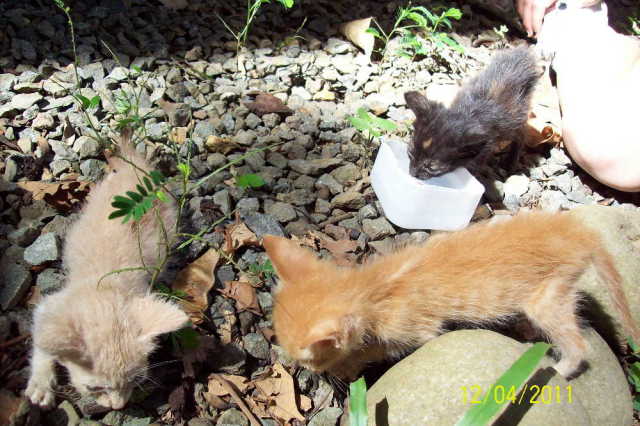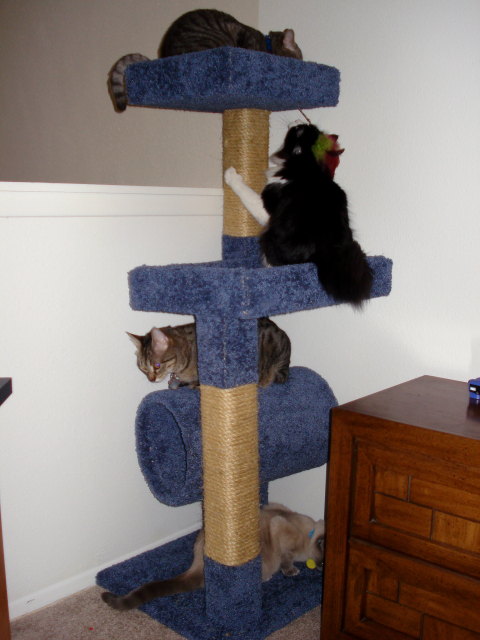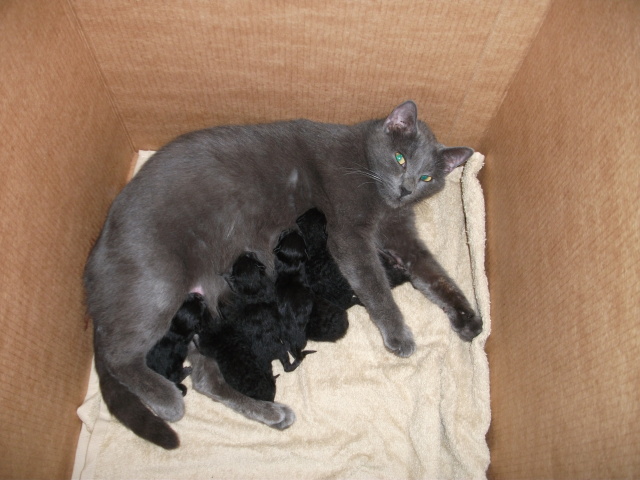QuestionWhat are the chances (if any) of turning a feral kitten (approx. 8 weeks) into a domesticated cat?
AnswerKristina,
Quite good actually. Generally when a kitten is younger than 12 weeks of age they're still quite impressionable and making changes like domesticating a baby born feral are significantly easier than they would be if you waited until they were older. With time, patience, consistency, persistence and gentle handling this baby should turn around fairly quickly. One mistake that pet parents commonly make when they're working with feral, fearful or otherwise not quite domesticated cats or kittens is that they rush things. This baby should be confined to a single room in your home where you can easily place food, water, at least two kitten sized kitty litter pans, a cozy place to sleep and a few toys (it's important that the food/water dishes be located as far away as possible from kitty litter pans since cats are very clean animals and they don't like to relieve themselves in close proximity to where they eat). In my experience fearful or feral kittens can be defensively aggressive so it's important to consider wearing thick clothing and/or leather gloves if you plan to handle the kitten before s/he's ready to be handled in order to minimize the chances of being scratched or bitten. Kittens this age are still very playful so using toys like kitty teases, kitten mittens, an old shoelace, toy mice, etc can all be very useful to help bring this baby out of his/her shell more quickly.
Food easily motivates most animals, especially growing kittens who could use a good meal. You can give a kitten any meat/broth baby food (provided it doesn't contain salt, onions, garlic or other spices) as a treat. Since this baby's diet will very likely be undergoing a significant change I'd strongly suggest that you give him/her 1/2 tbsp of plain, unsweetened (organic if possible) yogurt twice daily to help minimize the chances that this baby will develop a bad case of diarrea, especially since this kitten is already likely living with a heavy burden of intestinal parasites which can cause problems in and of themselves in very young animals if left untreated. When considering what to feed this baby you may be tempted to consider feeding whatever the pet supply store staff recommends or even what your vet suggests that you feed. My recommendation is to take the time to do some research on your own before making up your mind about what's best to feed your kitten. One thing that you absolutely should avoid feeding your kitten is dry cat/kitten food of any kind. Cats differ from most mammals because they evolved from the desert, what this means is that they don't have the same drive to drink water that dogs or other mammals have so they absolutely must receive the majority of the water they need to be healthy from their food.
There is so much conflicting information out there about the nutritional needs of cats and to be honest I was of the opinion that pet food manufacturers and veterinarians knew better than I did since they conducted scientific studies specifically geared towards understanding the nutritional needs of cats and I followed their advice buying very expensive premium foods that were supposedly made from the safest and highest quality ingredients, comfortable in the knowledge that my cats were eating a high quality diet, then the bottom dropped out of my world...During the Menu Foods pet food recalls in 2007 my eldest cat developed severe acute renal failure as a direct result of eating cat food tainted with melamine, she nearly lost her life because of the food that I put into her bowl and that still haunts me today. Once my baby girl recovered and came home in need of daily injections of fluids under her skin in order to be properly hydrated and allow her kidneys to function properly I decided that I would never again put my cats at risk by feeding them improper diets. I took it upon myself to do my own research about pet foods, the pet food industry and ways to ensure that I never had to go through the anguish of not knowing from day to day if one of my cats would live or die simply because I put something harmful in their bowls and asked them to eat it. Much of what I found out was shocking to say the least. Contrary to popular belief veterinarians really aren't all that well versed in pet nutrition, in fact the pet food industry provides the vast majority of education on the nutritional requirements of our pets and the veterinary profession seems content to trust the scientific studies that are conducted on pets. Many large pet food manufacturers also gain the trust of veterinarians in private practice to such an extent that they actually pay the veterinarian to recommend their specific brand of food to his/her clients, in some cases pet food companies go so far as providing veterinarians who recommend their products with food free of charge or at a nominal cost which allows the clinic to profit considerably from the sales of the foods veterinarians are recommending - I guess you could say that some veterinarians are being paid to recommend specific brands of pet food however indirectly it may be. In my opinion this raises a troubling question...Are the majority of veterinarians who are being paid to recommend pet food brands actually aware that companion animals are suffering from preventable conditions directly related to improper nutrition with increasing frequency? My experience has taught me to look more closely at the motives of people who strongly insist that I put specific things into my cats' bowls, after all, who stands to profit when pets become sick?
While the pet food manufacturers claim that theirs is a heavily regulated industry, based on what I've seen I beg to differ. The Menu Foods pet food recalls of 2007 clearly showed just how minimal the standards that protect our pets truly are. While I've since heard that the reason melamine tainted pet food made it onto shelves of pet supply stores and veterinary clinics to kill thousands (maybe even tens of thousands) of beloved pets and cause permanent chronic kidney disease for countless others is because of the fact that melamine mimics rice protein in laboratory tests I'm not entirely comfortable with that explanation, it lets the pet food manufacturers off too easily in my opinion. Apparently once the tainted food was discovered and the symptoms of melamine poisoning were made public many veterinarians in Canada and the US realized that they may have been treating pets with melamine poisoning for quite some time before the public was notified. Some of the ingredients that make it into pet foods are absolutely disgusting to put it nicely, some pet food companies claiming that they use human grade ingredients are technically being truthful, many of these companies are actually using the parts of food animals raised for human consumption that are discarded after processing. There are pet food manufacturers out there that do make high quality traditional pet foods, however there really aren't enough in my opinion. Pet food manufacturers don't have to follow any specific legal definitions with regards to how they label pet foods, what this actually means is that pet food companies can use terms like human grade, holistic, premium and high performance without any actual proof that the product is as it appears on the label. When you combine that with pet food commercials which feature wonderfully nutritious, high quality lean meats/poultry and beautiful fresh vegetables pet parents truly aren't getting what they're paying for. Companies tend to use a lot of cheap fillers as a means to reduce the amount of more expensive and nutritious ingredients that they put into their foods. Another sneaky trick that pet food manufacturers use to their advantage is called ingredient splitting. This term refers to the common practice within the pet food industry of listing single ingredients like grains and other cheap fillers in all forms as single ingredients. For example, a pet food manufacturer can quite legally take an ingredient like corn and add it to the pet food in various forms, then instead of simply listing corn as the ingredient they will list each form of corn that they've used such as corn, corn meal, corn flour, corn starch, etc. The pet food industry has realized that pet parents are becoming more educated about pet food and they're learning more about what should or shouldn't end up in their pet's food. The problem with ingredient splitting is that it makes pet foods seem like they contain minimal amounts of grains or fillers when in reality if you combined all forms of a single ingredient listed on the label the filler would outweigh the meat, poultry or fish meaning that what initially appears to be a high quality, healthy food is actually very low quality and pet food companies are getting away with charging top dollar for an inferior product. I've taken the liberty of sending you a list of websites that will help you learn more about the nutritional needs of cats and kittens. The web addresses are as follows:
- www.catinfo.org
This is the website that my vet referred me to when I asked her about the possibility of feeding my cats a homemade raw diet. Be forewarned that many vets will strongly discourage you from feeding a raw diet claiming that commercially prepared foods are 100% balanced and healthier for your pets. This website was created by a veterinarian and she explains things in a very down to earth way, she also has information about providing your kitty with a higher quality commercially produced canned cat food if you're not entirely comfortable feeding your kitten a homemade raw diet initially. This site does contain a small recipe for homemade cat food that's well balanced and properly supplemented.
- www.catnutrition.org
When you read through the information on catinfo.org you will notice that this site is referred to fairly frequently in different areas of the site. This website provides very interesting information for pet parents and it also contains a larger homemade raw cat food recipe that's well supplemented and properly balanced.
- www.felinespride.com
Feline's Pride is a company that produces a very high quality raw cat food which they supply to regular private customers as well as larger organizations like zoos and shelters. This food has an incredible testimonial page that blew my mind. The company ships throughout the US and some of Canada and they guarantee that their product will arrive at your doorstep still mostly frozen provided that you are present to sign for the delivery and immediately put it into your freezer. Obviously if you aren't home to receive the shipment the company won't be held liable for food that arrives thawed or spoiled.
- http://www.halopets.com/pet-articles/pet-education/pet_food_what_you_need_to_kno...
This article is brutally honest and I must admit really difficult to stomach in certain points, but the folks at Halo (they make Spot's Stew canned and dry cat and dog foods as well as various natural supplements for pets) do a great job of providing information about the pet food industry that the average consumer isn't aware of. I think that this article is a must read for any pet parent because it will truly change the way you think about the food you put into your pet's bowl.
While dogs can be quite healthy on a vegetarian diet or a diet that gets the majority of its protein from vegetable sources a cat's nutritional needs are very different from those of dogs. Cats are obligate or true carnivores, what this means is that their diet should be comprised of high quality meat and have very little vegetables or grain. If fed improperly over an extended period of time cats can actually become very sick. There are ailments that are directly related to improper nutrition such as obesity which puts cats at risk for serious chronic conditions such as diabetes, stones, crystals or blockages in their urinary tract, kidney failure, etc. Veterinarians claim that pets are living longer now than they ever have and to a point they're right, pets are receiving vaccines that are saving their lives by preventing diseases or infections that could potentially prove fatal which is a good thing, to a point. There's been some good research in the last few years that suggests pet parents are vaccinating their pets too much, too often which is causing an increase in problems like autoimmune disorders, kidney disease, certain cancers, skin problems, etc. Ideally pets should be vaccinated properly as young animals and then given vaccines that are required by local laws as infrequently as possible. There's some evidence to show that pets who are vaccinated less frequently live longer, healthier lives. If your new kitten is going to go outside then obviously his/her needs for vaccines will be substantially different from those of an indoor only cat so this is certainly a topic you'll want to research quite well. If you want to minimize the amount of vaccines that your pets are exposed to then you could ask the veterinarian to perform a blood titer test to find out whether your pet has the appropriate level of immunity against illnesses and infections we regularly vaccinate against.
My recommendation for any pet parent who brings a stray or feral cat or kitten into their lives is to have their foundling examined by a vet ASAP in order to ensure the health and safety of their new companion since there are many serious health issues that stray/feral cats can end up with simply because they're trying to survive with little or no proper food, clean water, shelter or medical attention. It's not unusual for a stray or feral kitten to have medical issues ranging from the relatively easy to deal with such as fleas, ticks or mange mites to the far more serious such as potentially fatal bacterial or viral infections (kittens don't have a fully mature immune system so they may not have the resources to fight off viral and bacterial infections like adult cats or vaccinated house cats have). If you notice that your kitten has ticks (they kind of look like greyish/brownish balloons attached to your kitten's skin) it's important that you try not to remove them unless you've been shown by a veterinarian how to remove them properly. Ticks that aren't removed properly can leave their mouths behind in the kitten's skin and cause bacterial infections that could potentially be quite serious depending on this kitten's overall condition. At this point it's best to assume that this tiny baby will need a visit to your veterinarian ASAP to have a thorough physical exam which may include analyzing a stool sample, skin scrapings, swabbing inside his/her ears and putting the contents of the swab onto a microscope slide to check for the presence of ear mites (these little bugs can drive a kitty crazy - just imagine thousands of tiny bugs wiggling inside of your ears and knowing that there's absolutely nothing you can do about it...) and your vet may also recommend blood work to see if the kitten's health has been seriously affected by living on the streets for his/her entire life. Your vet may also recommend testing for Feline immunodeficiency virus (FIV) and feline leukemia (FeLV), these two viruses are somewhat like HIV/AIDS in people (don't worry, these viruses can't be passed to people), a diagnosis of feline leukemia or FIV isn't necessarily a death sentence (although many vets do recommend euthanasia). I've shared my house with a number of FIV or FeLV positive cats in my time and while some needed my help to guide them to the Rainbow Bridge other cats lived long, full and relatively healthy lives. There are medications to treat intestinal parasites, mange mites, ear mites and external parasites so while the initial visit to the vet may be a bit on the pricey side it's certainly worth it when you consider that this kitten if given proper nutrition and kept as an indoor only kitty could potentially live twenty or more years the cost is small in the grand scheme of things. I am fully aware that the economy has put many loving pet parents into tough financial situations and I'd like to do my best to help these pet parents so I've compiled a binder full of resources for pet parents in Canada and the US that may be willing to help cover the cost of veterinary care by subsidizing any care the cat/kitten needs partly or fully (depends on the charity/organization and the resources they have available to them). In the event that you may need a bit of help with the financial cost of providing veterinary care for this kitten I'd be happy to try and help you find an organization in your area that would help cover some or all of the costs, all that I ask is for you to provide me with the general area you're writing from (a US state or Canadian province will suffice) - this saves me considerable time and energy since I don't have to type out all of the resources that I know of and it saves you time because you're not forced to read through countless resources that aren't available in your area.
Contrary to popular belief feral and stray are not interchangeable terms when it comes to cats, stray refers to cats who have been discarded or abandoned by their human caregivers, feral cats are generally the offspring of stray cats and since they lack interaction with human beings they are naturally fearful of people - essentially they're somewhat wild and they see humans as large predators who may hurt them since they haven't learned that people can be the source of good things. Taming a truly feral kitten is a process that will take time and patience, every cat is different, if this baby is a true feral s/he hasn't had much if any contact with people which means that you'll have to be patient and persistant so that the kitten learns that you are the source of good things. Working to change the life of a feral kitty isn't something that you can look at as an instant fix, ideally you'll need to have plenty of extra time to spend with this kitten and loads of patience since rehabilitating these babies often has a one step forward, two steps back kind of process. It's important not to get frustrated while trying to gain the trust of a feral kitty since they will immediately pick up on that which will increase their fear of you which isn't something you want to do.
Generally what I recommend is for pet parents who'd like to invite a feral kitty into their lives is to take the time to completely push negative thoughts or feelings out of their mind before spending time in the same room as the kitty. Once you're able to do that effectively then ideally you'll feed the kitty on a schedule of meals (in a kitten smaller, more frequent meals are best as they help to reduce the chances of digestive upsets such as vomiting or diarrea) and perform litter box maintenance around the same time each day (separately from the meals if at all possible, this increases the amount of time you're spending in the same room as the baby). The kitten will begin to settle into a routine (cats of all ages are suckers for routine!), if you have a fairly flexible schedule I'd recommend taking time at least twice daily to come into the kitten's temporary quarters and sit in the same place each day with a good book or crossword puzzle so that you can spend 45 minutes or more with the kitten in a way that's completely non-threatening to him/her. By avoiding eye contact, not attempting to touch the kitten and not speaking to him/her you're allowing the kitten to get to know you and become more comfortable with you on his/her own terms. If you'd like to speed the process along then you could certainly bring in extra special treats such as meat/broth baby food or canned fish packed in water and set the plate just out of your reach.
Since food is a very powerful motivator many cats begin to at least come closer and explore the food within a fairly short period of time. A frightened or anxious animal usually will not eat in the presence of a person so once the kitten begins eating from the plate of treats you can gradually (about half an inch each day) move the plate of food closer to you until the kitten is comfortable eating off of a plate right next to you. Once the kitten is comfortable and confident enough to eat next to you you can also begin enriching his/her environment by starting to play with him/her - a fairly long old shoelace works well for this (just be sure that you remove any string like toys when you're not there to supervise because cats can accidentally swallow these types of objects and if they block the digestive tract the cat may need surgery to remove them). Ideally when you first start to play with the kitten you'll want to try and keep the toy as far from you as possible (this is why kitty teases are great, their handles vary in length and the lures vary in type) and try to minimize the amount that you're moving since sudden moves may still send the kitten back into hiding. Over time with your help your new kitten will begin getting more comfortable with your presence and realize that people can be associated with good things and there's nothing to be afraid of. You can start thinking about intensifying the socialization process by exposing the kitten to a variety of people gradually once s/he becomes completely comfortable with you and you can easily handle him/her without having the kitten become startled fairly easily.
Since you'll presumably be taking this baby away from everything that s/he knows and is comfortable with I would recommend that you consider administering a homeopathic remedy called Bach's Rescue Remedy which is a blend of 5 flower essences designed to calm and reassure. I've used Rescue Remedy in my household for a variety of issues and it works wonderfully the majority of the time (when it doesn't work I try other remedies since it's likely I've given the wrong one if it doesn't work). You can administer Rescue Remedy a couple of ways, if the kitten allows you to hold and interact with him/her then you can gently rub 5-6 drops of Rescue Remedy into the outside of her ear flaps or the relatively fur free area of skin in front of her ears (do try to avoid getting any of the remedies in the baby's ears as the flower essences are preserved in a grape alcohol solution which can sting quite a bit if it gets into the kitten's ears) a drop at a time 3-4 times a day (in the event that you're able to do this then s/he's not likely a feral baby, it's more likely that s/he's an abandoned stray). If this baby is a true feral then you may have to resort to mixing the remedy in with his/her water and changing the water at least twice a day to ensure that the water is fresh and the kitten is getting the remedy as fresh as possible as often as possible. Due to the fact that cats have a great sense of smell I wouldn't recommend adding Rescue Remedy to their food unless it's very diluted because your kitty may very well refuse to eat the food.
I've done my best to provide you with an important cross section of things that you'll need to know in order to be successful at rehabilitating this kitten so that you can share your life with him/her for many years to come. I also took the liberty of including information on medical care, vaccines as well as nutrition and I do truly hope you've found the information useful. I'd be more than happy to answer any cat related questions or address any concerns that might come up after reading this question or over the next few weeks while you work towards rehabilitating this baby so please, don't hesitate to contact me again. I wish you luck, you and your kitten are in my thoughts and I look forward to hearing how things are progressing when you've got time to send an update my way.

 Cat in Heat with a little blood in her stool
Question
Millie Moo
Hi, I have a 5 month old female kit
Cat in Heat with a little blood in her stool
Question
Millie Moo
Hi, I have a 5 month old female kit
 Orphaned baby kittens in the rainforest
Question
kittens
Hello,
My wife and I are volunteers in
Orphaned baby kittens in the rainforest
Question
kittens
Hello,
My wife and I are volunteers in
 Strange litter tray behaviour
Question
Edgar
I have a beautiful two year old n
Strange litter tray behaviour
Question
Edgar
I have a beautiful two year old n
 Cat and Dog Introductions
QuestionHi!
I recently acquired a tortie; although I wa
Cat and Dog Introductions
QuestionHi!
I recently acquired a tortie; although I wa
 Litter of 9 kittens, born 2/05/10
Question
Smoke and babies
Although we have had 2 adult
Litter of 9 kittens, born 2/05/10
Question
Smoke and babies
Although we have had 2 adult